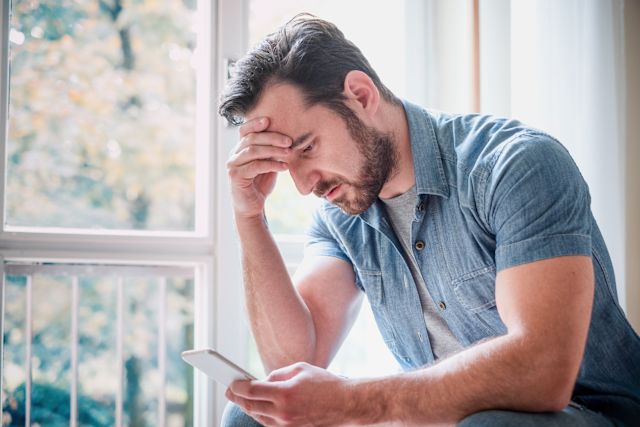Updated on September 29, 2025.
When tragedies, natural disasters, wars, and other crises are unfolding around the world, it may be difficult to focus on your normal day-to-day routines—even if you’re hundreds of miles away. The unprecedented interconnectedness of the digital age offers a window into the experience of others, allowing anyone with a screen to witness these events as they unfold in real time.
The constant barrage of social media posts and images can be hard—nearly impossible—to avoid. But this may come at a hefty price. Research suggests that exposure to media coverage of traumatic events can affect viewers’ mental health.
In recent years, large-scale traumas, such as terrorist attacks or mass shootings, are not only being covered with greater frequency, but also with more repetition. Media coverage has evolved to include more graphic images, video, and descriptions of disturbing events as well. Exposure to this coverage is tied to more stress and worse mental health in the near-term as well as post-traumatic stress responses and physical health issues later on, according to a 2019 study published in Science Advances.
The researchers also pointed out that those who are particularly anxious about such events and the uncertainty they bring, may cope by seeking answers and information from the media. As a result, those who are anxious and perhaps more vulnerable to graphic media content may have greater exposure to it.
How the body reacts to traumatic events
Traumatic events can trigger a range of emotions and well as physical symptoms. Some common reactions may include:
- Disbelief or shock
- Fear or anxiety about what the future holds
- Feeling disoriented
- Trouble concentrating or making decisions
- Feeling emotionally numb or apathetic
- Irritability or anger
- Sadness and depression
- Crying for “no reason”
- Feeling guilty or hopeless
- Being overly concerned about safety
- Changes in appetite or eating habits
- Headaches
- Digestive issues or stomach pain
- Trouble sleeping
- Feeling jumpy or easily startled
- Heavy drinking or drug use
You do not have to sacrifice your mental health when trying to learn about or bear witness to global events. Being kind to yourself isn’t a luxury—it’s essential for you and your loved ones, according to Mary Alvord, PhD, a Maryland-based psychologist who is also an adjunct associate professor of psychiatry and behavioral sciences at The George Washington University School of Medicine and Health Sciences in Washington, D.C.
In cases like these, it helps to take a tip from the directions flight attendants give during safety presentations on airplanes: “Make sure you put on your oxygen mask first, so that you have the ability to put the mask on your child,” Alvord says.
Some ways that you can find balance and protect your mental well-being while trying to stay informed:
Seek perspective and look for the good. Tragic, inhumane, or unpredictable events can cause the future to feel dislocated and even scary. Rather than fixate on losses and the uncertainty of what may lie ahead, shift your focus to the present—and try to keep things in perspective, advises Alvord.
It may also help to recall a decades-old lesson from Mr. Rogers. During times of stress, he advised children to do something his mother told him as a child: “Look for the helpers, you will always find people who are helping.”
Those who feel powerless may also consider lending a hand themselves in any way they can. For example, donating to relief organizations, volunteering, or even just looking out for your neighbors or loved ones can bring solace and help you regain some sense of control.
Don’t forego all of your healthy habits. The mental and physical strain of living through a difficult experience can make it harder to sleep and to find the energy or motivation to exercise or stick to a healthy diet. Meanwhile, it may be more appealing to indulge in "comfort foods" that are high in sugar and salt. You may also try to take the edge off by drinking alcohol or smoking. Though tempting, these strategies come with serious health risks.
Control your breathing. Deep breathing may feel unnatural but it can help manage a stress response triggered by distressing events. When your mind races, your breathing speeds up and your pulse rate rises as well, Alvord says. Deep breathing can slow the heartbeat and lower blood pressure. Another option is mindfulness meditation, which helps you not catastrophize an already scary situation. “With mindfulness, you’re engaging your senses, focusing on the present rather than the future and also not harping on the past,” Alvord says.
Give the news a break. In the era of streaming news and social media, Alvord suggests watching the news no more than two to three times a day and limiting news notifications on your phone. If you find yourself unable to disengage from media coverage, step outside to interrupt the cycle of rumination. “Being out in the fresh air gives you a different perspective,” Alvord says. It can “get you out of your head” and shift your thoughts away from troubles or worries.”
Even if you can’t get away for a long break, just a few minutes might do the trick. “Go outside at the top of each hour for five minutes and just walk around,” she recommends.
Stay connected to your loved ones. Connecting with others is especially important during times of crisis, Alvord says. “We learned a lot from 9/11—the people who fared the best had strong social support.” If you can’t get together with loved ones or friends in person, the next best thing is to connect via phone or video chat.
Be realistic and kind to yourself. When life becomes difficult, most people are simply attempting to get by—not thrive. Try to give yourself a break when you need one. That may mean not placing pressure on yourself to be perfect, or to maintain the same level of productiveness and efficiency as you would under more normal circumstances. Sometimes just getting through each day is enough.
Ask for help. Reaching out for support is not a failure or sign of weakness. Talking to a loved one, trusted friend, or spiritual advisor can help you cope with your feelings. Seek the support of a trained mental health professional if your physical or emotional response to stressful events is severe or prevents you from working or engaging in your daily routine.







